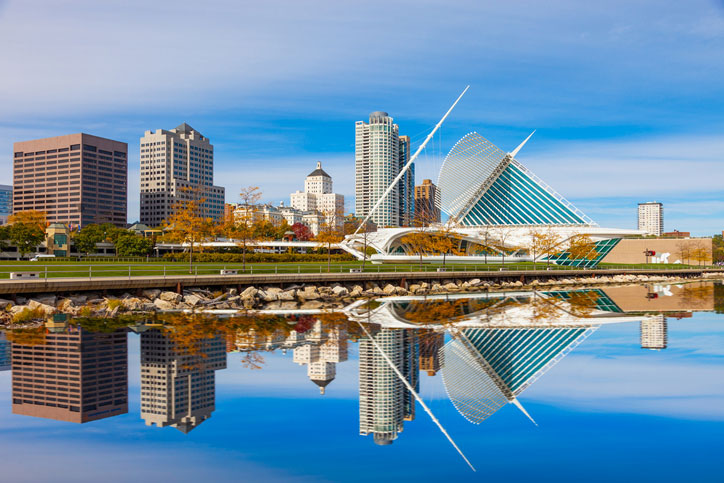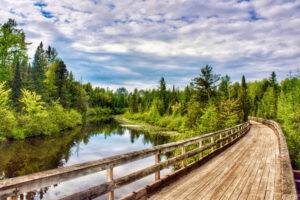Written by Catherine Dorian

Writers thrive when they have the freedom to discover and explore their inner voice. But writers also need community; we find inspiration and novelty in comradery with other storytellers, poets, and thinkers.
It’s no surprise that the Midwest has long been a region for creatives. Its sprawling fields, scattered lakes, wild woodlands, and combination of eclectic rural communities along with its vibrant cities meet the unique needs of the artistic mind. And in the state of Wisconsin, the pioneering writer has long been an integral contributor to the area’s culture.
Modern Literary Greats that Left Their Mark on Wisconsin
 A look at Wisconsin’s successful writers captures the state’s commitment to putting the region on the map for popular culture and learning. Historian and Band of Brothers author Stephen Ambrose was raised in Whitewater, earned his doctorate from the University of Wisconsin-Madison, and became a bestseller. Many people don’t know that Laura Ingalls Wilder’s Little House series began in the woods; she spent her early life in a log cabin in Pepin with her family. Wisconsin has long demonstrated a commitment to preserving the environment and developing a code of ethics for our relationship to the earth. That might be because of writer-philosophers like Aldo Leopold and John Muir, who lived in rural Montello with his family after immigrating to the United States from Scotland.
A look at Wisconsin’s successful writers captures the state’s commitment to putting the region on the map for popular culture and learning. Historian and Band of Brothers author Stephen Ambrose was raised in Whitewater, earned his doctorate from the University of Wisconsin-Madison, and became a bestseller. Many people don’t know that Laura Ingalls Wilder’s Little House series began in the woods; she spent her early life in a log cabin in Pepin with her family. Wisconsin has long demonstrated a commitment to preserving the environment and developing a code of ethics for our relationship to the earth. That might be because of writer-philosophers like Aldo Leopold and John Muir, who lived in rural Montello with his family after immigrating to the United States from Scotland.
Modern writer of literary fiction Jane Hamilton, a recipient of the PEN/Hemingway Foundation Award for her novel The Book of Ruth, also started her career in Wisconsin. But Wisconsin doesn’t only cultivate nature-writers and small-town stories. Screenwriter, TV series writer, novelist, and social commentator John Ridley IV (12 Years a Slave, American Crime) spent most of his childhood outside Milwaukee.
Due to its longstanding community of writers, Wisconsin boasts a robust literary heritage. Though humble in spirit, the state embraces its culture for storytelling, thinking, and learning. Several English Departments across the University of Wisconsin system have developed their own literary publications and publishing houses, which offer a platform for the state’s diverse talent. The Sheepshead Review of the University of Wisconsin Green Bay and the Midwest Review have both featured some of America’s premier short story and nonfiction essay authors, including Dennis Day and Pardeep Toor.
Between its workshops, literary publications, and indie publishing houses, Wisconsin proves itself to be a space for writers to learn and to grow, whether you’re an aspiring undergrad looking for a BA or BFA (Bachelor of Fine Arts) or are well on your way with your sights set on an MA or Master of Fine Arts (MFA) in creative writing. And as a writer, you know that learning and growth are at the heart of our craft.
Wisconsin’s Creative Writing Classes, Courses, and Workshops Can Prepare You for a Creative Writing Degree
Any writer will tell you that success comes from consistency and your own hunger for challenge. Enter contests, submit your work for publishing, subject your prose to scrutiny—it’s all part of the process for building your portfolio of work.
Wisconsin’s writers and writing teachers already offer several workshops, conferences, and classes that will give you the formative experience that can help you succeed when you’re enrolled in an intensive residency or bachelor’s degree.
Wisconsinites are eager to support the state’s writers and build a vibrant community to sustain its literary legacy. Jodie Mortag, Assistant Professor of Writing at Lakeland University, hosts the annual Great Lakes Writers Festival, where writers across all genres, ages, and regions of the Midwest gather for free workshops and networking events. You read that right: free. Jodie even provides a special event for high school writers. The Wisconsin Academy of Sciences, Arts & Letters also offers a robust catalogue of workshops taught by local writers, including the intensive “Write Your Novel in Eight Weeks” and courses specifically for naturalists, nonfiction writers, and poets.
When it comes to writing, Wisconsinites are also good at finding their people. Red Oak Writing offers retreats and roundtables for young, emerging writers who benefit from building a support network. Wisconsin has its own chapter of Romance Writers of America, and they offer workshops in various areas around the state. The aspiring crime novelist or murder mystery fanatic can even attend the Writer’s Police Academy, a training on true crime, done by law enforcement officers and forensic scientists who know their genre in real life.
Getting involved in the writing community is also about getting involved in the literary community. The Wisconsin Book Festival, offered through the Madison Public Library Foundation, hosts free events that feature public authors and conversations year-round—and the conference has featured an impressive catalogue of prize-winning authors (Jane Smiley, Stacey Abrams, and Mark Bittman, just to name a few!).
Besides attending workshops and conferences, Wisconsin writers are also dedicated to grassroots efforts that build communities of writers. If you’re looking for a writing group in your area of the state, check out the Wisconsin Writers Association. On their website, you can make your own profile and look for one of their registered writing groups—or you can start your own. They also keep an updated list of all the state’s workshops and conferences. You can consider them your database for writing in the state, especially if you’re just getting started.
Between its opportunities for publication and for learning from and with writers across all levels of experience, Wisconsin proves itself to be a hub of inspiration and vibrant culture for writers. You can amass a plethora of skills and tips by immersing yourself in the writing community.
If attending workshops and taking courses helps you find other writers and practice your skill, you’ll find a special sense of intimacy and support in any of the rigorous creative writing programs offered at Wisconsin’s colleges and universities.
Writing Colleges in Wisconsin Offering Bachelor’s and Master’s Degrees in Creative Writing Provide a Path to Becoming a Writer
Of course, earning a bachelor’s or master’s degree in creative writing can help you hone your skills and join a community of fellow artists. If you’re in Wisconsin, you have several options for college-level programs, all of which will challenge you with instruction on narrative technique and workshops where you’ll learn to improve your work based on feedback.
Bachelor of Fine Arts (BFA) and Other Bachelor’s Degrees in Creative Writing in Wisconsin
Beloit College
ENGLISH DEPARTMENT
Accreditation: HLC
Degree: Bachelor – BA
Private School

- English-Creative Writing
Cardinal Stritch University
HUMANITIES DEPARTMENT
Accreditation: HLC
Degree: Bachelor – BA
Private School

- Creative Writing (Writing, Cultural Studies)
Lakeland University
SCHOOL OF HUMANITIES AND FINE ARTS
Accreditation: HLC
Degree: Bachelor – BFA
Private School

- Creative Writing
Northland College
HUMANITIES DEPARTMENT
Accreditation: HLC
Degree: Bachelor – BA
Private School

- Writing
St. Norbert College
DIVISION OF HUMANITIES
Accreditation: HLC
Degree: Bachelor – BA
Private School

- English-Creative Writing emphasis
University of Wisconsin-Green Bay
Accreditation: HLC
Degree: Bachelor – BFA, BA
Public School

- BFA - Writing and Applied Arts
- BA - English-Creative Writing emphasis
University of Wisconsin-Madison
COLLEGE OF LETTERS AND SCIENCE
Accreditation: HLC
Degree: Bachelor – BA
Public School

- English-Creative Writing track
Master of Fine Arts (MFA) and Other Master’s Degrees in Creative Writing in Wisconsin
University of Wisconsin-Madison
COLLEGE OF LETTERS AND SCIENCE
Accreditation: HLC
Degree: Master – MFA
Public School

- Creative Writing




